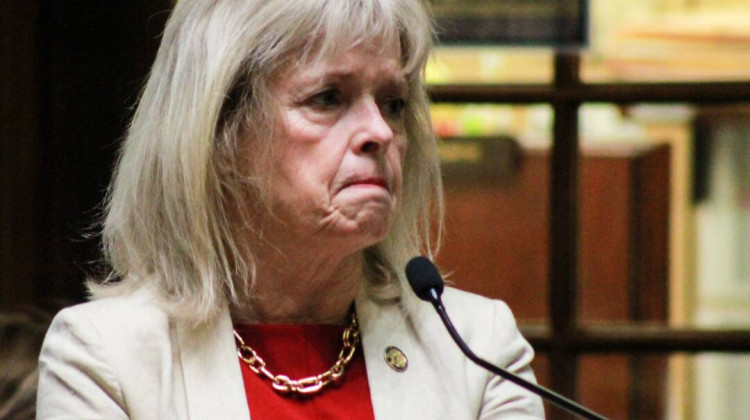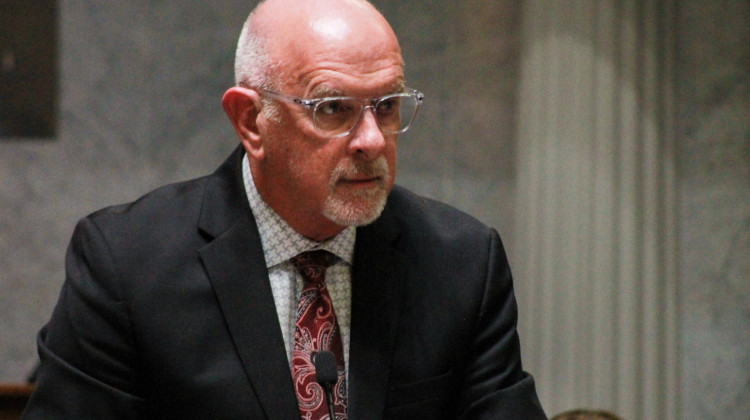
The report measures civic health by analyzing data about voting and voter registration, social and community connectedness, and civic awareness and action.
Lauren Chapman / IPB NewsIndiana ranks among the lowest states in the country in civic participation. Groups from across the state met at the Indiana Civics Summit this week and hope to work together to boost civic engagement and increase voter turnout.
Much of the discussion at the summit was framed around the results of this year’s 2023 Indiana Civic Health Index.
The report measures civic health by analyzing data about voting and voter registration, social and community connectedness, and civic awareness and action.
Indiana ranks close to last in the country in several categories measured by the report, especially those related to voting. Bill Moreau of the Indiana Citizen Education Foundation said these data points are a big problem.
“The civic health of Indiana is really pretty poor. Let’s just say it,” he said.
Moreau added that the report most recently listed Indiana as one of the states with the lowest voter turnout during midterm election years. The report compared Indiana to the other 49 states and the District of Columbia.
“This report, which is based upon 2022 election returns, has us ranked 50th for turnout,” Moreau said. “But we’re not last. Thank goodness for West Virginia, or we would be.”

Ellen Szarleta, director of the Center for Urban and Regional Excellence at IU Northwest, said states with better civic health generally experience less violent crime and have better economic opportunities.
“Our civic participation is something that is working to make a difference in our communities,” she said. “It will take institutional actions, political actions and also non-political actions as well to ensure that we have a thriving democracy.”
Panelists at the summit discussed the implications of Indiana’s current civic health index and brainstormed how to get high school and college students more involved in the political process, especially by voting.
Stakeholders like state universities, The League of Women Voters and the Indiana Election Division shared their strategies for engaging young Hoosiers.
“If we’re going to get that youthful population here in Indiana to vote, we have to be really surgically intentional about how we do that,” said Erin Lewis, University of Evansville Center for Innovation and Design executive director.
Some panelists suggested getting students more involved in the democratic process by encouraging them to work at the polls. Another suggestion was made to make it easier for students who don’t have driver’s licenses to register online.
“We want these young people to vote. Let’s make it easy for them to do so,” Lewis said.
READ MORE: Indiana’s 2024 primary is May 7. What do I need on Election Day?
Join the conversation and sign up for the Indiana Two-Way. Text "Indiana" to 765-275-1120. Your comments and questions in response to our weekly text help us find the answers you need on statewide issues and the election, including our project Civically, Indiana.
Voting and voter registration is not the only indicator of civic health. Summit attendees also heard how students at Indiana colleges are getting hands-on experience solving problems and designing projects for local governments and businesses.
The summit’s keynote speaker, retired Indiana Supreme Court Justice Steven David, told attendees there are only three days in the week: yesterday, today and tomorrow. David encouraged everyone at the summit to look forward and think ahead when considering how to improve Indiana’s civic engagement.
The Indiana Bar Foundation also announced a new voter registration toolkit. The toolkit is designed to help organizations reach young people to encourage them to vote and get involved in their communities.
The Indiana Civics Coalition Voter Registration Toolkit includes educational materials like infographics, fact sheets and guides to help young voters navigate the voter registration process. It also provides resources, social media templates, and printable forms to distribute at events.
Kirsten is Indiana Public Broadcasting's education reporter. Contact her at kadair@wfyi.org or follow her on Twitter at @kirsten_adair.
 DONATE
DONATE






 Support WFYI. We can't do it without you.
Support WFYI. We can't do it without you.